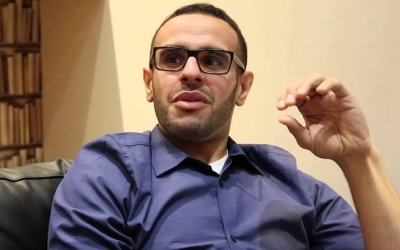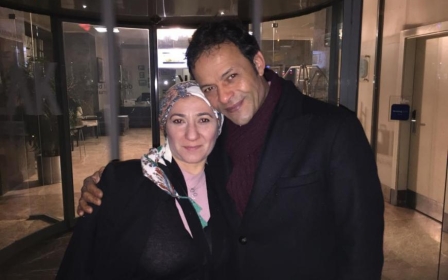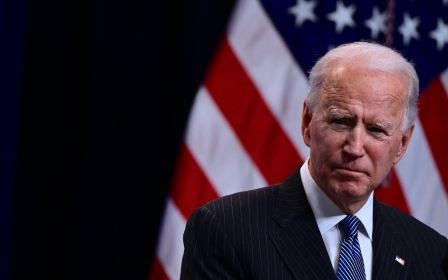Rights groups slam US arms sale to Egypt as activist's relatives arrested

Rights groups have slammed the Biden administration's decision to approve a $200m arms sale to Egypt amid reports that Cairo arrested the relatives of Egyptian-American activist Mohamed Soltan.
The State Department announced on Tuesday that it approved a $197m arms sale to Cairo, which consisted of 168 Raytheon-made Rolling Airframe Missiles. The weapons were requested by the Egyptian navy to improve defence in coastal areas and around the Red Sea.
The department said it approved the sale, subject to congressional review, as Egypt "continues to be an important strategic partner in the Middle East".
On the same day, the Freedom Initiative, a rights group Soltan helped create, reported that plain-clothes officers raided the homes of six of the activist's relatives, including two cousins who are not involved in politics, detaining them in a "campaign of retaliatory aggression".
Soltan himself had been jailed for nearly two years in Egypt before being released in 2015. He spent 490 days on hunger strike and told MEE in a previous interview that he lost a third of his body weight and nearly died 10 times.
'The severity of the repression under President Sisi should have already stopped Egypt from receiving US arms'
- Elisa Epstein, HRW
US State Department spokesperson Ned Price said in a statement that the US administration was "looking into" reports about the targeting of Soltan's relatives.
"We have and we continue to engage the Egyptian government on human rights concerns, and we take seriously all allegations of arbitrary arrest or detention as we said in other contexts," Price said during a media briefing on Tuesday.
Sarah Leah Whitson, the executive director of Democracy for the Arab World Now (DAWN), told Middle East Eye on Wednesday that the approval of the sale "suggests the promises of the Biden administration to end 'blank checks' for dictators were pretty hollow".
"The Biden administration's rhetoric about 'human rights values' has zero value when it's accompanied by the wink and nod of continued military support to Egypt's dictatorship," she said.
"If the US is serious about ending its support for abusive dictators, as Biden promised, then it's got to actually end its support for abusive dictators, not just talk about it."
Seth Binder, advocacy officer for the Project on Middle East Democracy (Pomed), said the timing of the announcement sent "an unfortunate signal of support for President el-Sisi's military regime and it is devastating that Soltan and his family are forced to endure more of this abuse".
Arms sales versus human rights
Since coming to power in a 2013 military coup that toppled the country's first freely elected leader, President Abdel Fattah el-Sisi has jailed as many as 60,000 dissidents, rights groups say.
Sisi has consistently denied that there are political prisoners in the country, framing the crackdown as part of a fight against terrorism.
During the campaign trail, Biden issued a stern warning to Sisi, saying that if he were to be elected president, there would be "no more blank checks for Trump's 'favourite dictator'."
Elisa Epstein, an advocacy officer at Human Rights Watch (HRW), said the targeting of Soltan's family highlighted "exactly why the US should halt all arms sales to Egypt".
"The severity of the repression under President Sisi should have already stopped Egypt from receiving US arms. It's extremely disappointing to see an arms sale to Egypt approved early in Biden's tenure," she said.
Philippe Nassif, Amnesty International USA's advocacy director for the Middle East, noted that while the Biden administration had taken great strides by placing human rights at the forefront of international engagement, more pressure was still needed.
Since coming into office, Egypt released Al Jazeera journalist Mahmoud Hussein who was held for more than 1,000 days, and Saudi Arabia released prominent women's rights activist Loujain al-Hathloul.
"What we are looking for is meaningful changes that last, not just the temporary release of detainees who should have never been arrested, tortured, and held without trial in the first place, but a change in the behaviour of Saudi Arabia, Egypt, and other allies like the UAE," Nassif told MEE.
"So far, the Biden administration needs to amp up the pressure and indicate that there will be consequences for these human rights violations, such as a total ban in arms sales to these countries or other measures."
Middle East Eye propose une couverture et une analyse indépendantes et incomparables du Moyen-Orient, de l’Afrique du Nord et d’autres régions du monde. Pour en savoir plus sur la reprise de ce contenu et les frais qui s’appliquent, veuillez remplir ce formulaire [en anglais]. Pour en savoir plus sur MEE, cliquez ici [en anglais].





